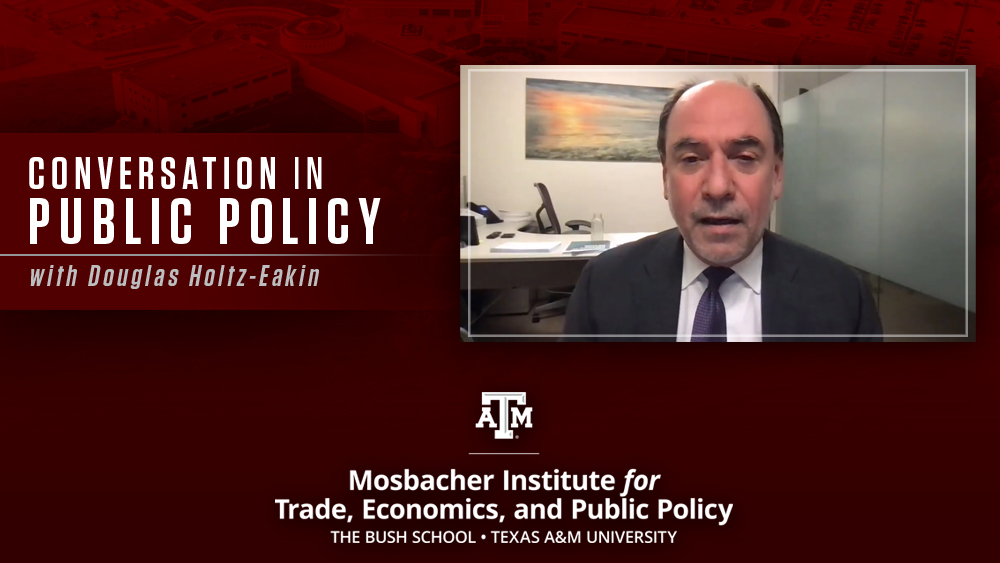
On November 18, 2020, the Mosbacher Institute for Trade, Economics, and Public Policy at Texas A&M University hosted a Conversation in Public Policy talk with Dr. Douglas Holtz-Eakin on the economic outlook for 2021. Holtz-Eakin has a distinguished record as an academic, policy adviser, and strategist. He was formerly the 6th Director of the nonpartisan Congressional Budget Office from 2003 to 2005 and was Director of Domestic Policy for the John McCain presidential campaign from 2007 to 2008. Currently, Holtz-Eakin serves as the President of the American Action Forum and recently was a Commissioner on the congressionally chartered Financial Crisis Inquiry Commission.
After a welcome by Dean Mark Welsh and an introduction by Dr. Raymond Robertson, Holtz-Eakin began his remarks by first describing the unique context of the current recession, which he maintains is different from other 21st century recessions that began with financial market events that spilled over to the mainstream economy. In the current recession, the US economy was growing by 2.5 percent until mid-May, when virus cases spiked, causing a dramatic change. People from high-income zip codes stopped consuming services. For growth to return, Holtz-Eakin says, we have to get Americans comfortable with resuming their economic commerce.
Holtz-Eakin also stressed that the low-income workers who provided those services to high-income individuals were the most affected, which created a phenomenal divergence in the labor market. In March and April, twenty-two million jobs were lost—nearly ten times more than any single month of job losses before.
Defeating the virus is the top priority, but according to Holtz-Eakin, we must also learn to operate the economy in the presence of the virus. He noted that the federal government and Congress responded well, with the Federal Reserve printing cash and Congress offering stimulus packages like the CARES act. However, with 11 million workers still unemployed, there could be a more typical, income-driven recession coming out of the housing sector, which is a big concern.
Transitioning into 2021, Holtz-Eakin described the policy implications of a Biden administration and a divided Congress. He noted that he thinks President-Elect Biden’s promise to raise taxes would be a mistake that would likely cause significant damage and explained that spending programs should focus on long-term productivity infrastructure-building investments that could secure bipartisan agreement. Holtz-Eakin also listed several areas where the United States needs to do better for the economy. First, he suggested a pause and relaunch of US trade policy, which has had significant damage done to it. Second, the United States must rethink its current immigration strategy because nothing is more important to the US economy than a pro-growth legal immigration system. Third, the United States needs to assume leadership on the climate change challenge and consider reducing taxes elsewhere in exchange for a carbon tax that would force business innovations that would move us away from carbon. Lastly, Holtz-Eakin mentioned two critical challenges—the federal debt, which is at its highest level relative to GDP in US history, and the state of the K-12 education system, whose failure condemns a quarter to a third of future US workers to an inability to compete effectively.
During the conversation portion of the program that followed, Dr. Lori L. Taylor, Professor and Head of the Bush School’s Department of Public Service and Administration, engaged Holtz-Eakin further about the economic implications of Biden policies, rising interest rates in relation to the debt burden, and the challenges of student loans. Bush School student Samantha Surface then had a chance to ask about his work experiences and advice for students interested in economic policy careers.
On the following day, Holtz-Eakin joined Dr. Laura Dague’s Economic Analysis classes, where Bush School students engaged him in further detail on the topics of student loans, carbon tax, and immigration, in addition to the COVID-19 financial crisis and economic recovery.
The Mosbacher Institute is very grateful to Dr. Holtz-Eakin for sharing his time and expertise and hopes to welcome him sometime in the future for a visit to the Bush School of Government and Public Service and more discussion.

